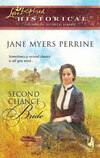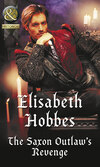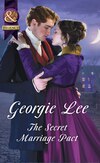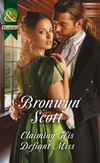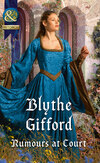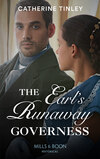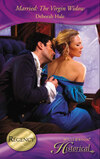Loe raamatut: «Second Chance Bride»
John’s gaze held hers.
All she could think about was how blue his eyes were, not cold as she’d thought earlier. His smile, even the tiny sliver he showed her, made her breathless. She didn’t feel at all like Annie or Matilda, but instead like a new, very happy and slightly unsure young woman.
“You have a wonderful laugh,” he said in a voice that made Annie believe he’d felt the same way about their shared moment.
What was happening between the two of them? She was overcome by a need to know more about the man. He slowly reached out and took her hand, looking at her as if she were the most beautiful woman in the world.
His daughter Elizabeth’s voice shattered the enchanting moment. “Father, I’m tired.”
In an instant, he let go of her hand. She put both hands to her cheeks. How could she have dared to look at John like that? And yet, he’d returned her gaze and held her hand. If she weren’t so happy, she’d be completely terrified.
MILLS & BOON
Before you start reading, why not sign up?
Thank you for downloading this Mills & Boon book. If you want to hear about exclusive discounts, special offers and competitions, sign up to our email newsletter today!
Or simply visit
Mills & Boon emails are completely free to receive and you can unsubscribe at any time via the link in any email we send you.
JANE MYERS PERRINE
grew up in Kansas City, Missouri, has a B.A. from Kansas State University and an M.Ed. in Spanish from the University of Louisville. She has taught high school Spanish in five states. Presently she teaches in the beautiful hill country of Texas. Her husband is minister of a Christian church in Central Texas where Jane teaches an adult Sunday school class. Jane was a finalist in the Regency category of the Golden Heart Awards. Her short pieces have appeared in the Houston Chronicle, Woman’s World magazine and other publications. The Perrines share their home with two spoiled cats and an arthritic cocker spaniel. Readers can visit her Web page, www.janemyersperrine.com.
Jane Myers Perrine
Second Chance Bride
Brethren, I count not myself to have apprehended: but this one thing I do, forgetting those things which are behind, and reaching forth unto those things which are before, I press toward the mark for the prize of the high calling of God in Christ Jesus.
—Philippians 3:13–14
This book is dedicated to Betty Davis Lynn,
who has been a friend for longer than I can
remember. Thank you for all these years of
friendship and your Christian example.
Also to two friends and critique partners:
Ellen Watkins and Linda Kearney,
who keep me headed in the right direction.
And, as always, to my husband George for his love
and support, even when he hated hearing those
three little words—I’m on deadline.
Contents
Prologue
Chapter One
Chapter Two
Chapter Three
Chapter Four
Chapter Five
Chapter Six
Chapter Seven
Chapter Eight
Chapter Nine
Chapter Ten
Chapter Eleven
Chapter Twelve
Chapter Thirteen
Chapter Fourteen
Chapter Fifteen
Chapter Sixteen
Chapter Seventeen
Chapter Eighteen
Questions for Discussion
Prologue
Central Texas, 1885
Annie MacAllister’s father had always told her she’d never amount to anything because she never thought anything through. Maybe he was right. Maybe that’s how she’d ended up in this swaying stagecoach while a disapproving woman glared at her in disgust and a dumpy man across from Annie leered.
Only an hour after the stagecoach left Weaver City, she tried to disappear, to shrink back into the hard bench of the stagecoach. She heard the elderly woman mutter, “Common.”
Annie knew why the woman said that. Annie wore a cheap dress, tight across the bodice and fraying at the cuffs. Her long hair curled over her shoulders, and she wore paint on her lips and cheeks.
The expression on the man’s face showed that he knew exactly what Annie was—an immoral woman who’d worked in a brothel. What he didn’t know was how much she’d hated every minute of it—how she’d been forced into it.
Next to Annie sat a young woman who wore an undecorated black straw hat and a plain, gray cotton skirt. Her matching basque was trimmed with what had been a crisp white collar when she got on the coach but was now limp and soiled from the dust of the trip.
“Is this your first trip in a stagecoach?” the young woman asked Annie in a soft, educated voice.
Well, if that wasn’t a surprise. The woman actually spoke to her in a friendly way. “Yes,” Annie answered, then added, “ma’am.”
“Mine, too.” She smiled. “My name is Matilda Susan Cunningham.” Miss Cunningham spoke clearly, just like Annie’s mother had, although that was so long ago it was hard for Annie to remember.
“Miss Cunningham.” Annie nodded. “I’m Annie MacAllister.”
“Where are you going, Miss MacAllister?” Miss Cunningham asked.
“Trail’s End.”
“I’m going there, too.” Miss Cunningham nodded. “Will your family meet you?”
Annie shook her head.
“My employer will meet me,” Miss Cunningham said.
“Not your family, Miss Cunningham?” Annie almost bit her tongue. She should know not to pry.
“Please, do call me Matilda, won’t you?”
Annie nodded, delighted by the attention of this kind woman.
“No, my family won’t meet me.” Matilda sighed. “My parents died when I was thirteen. My brother, only two months ago. That’s why I had to find employment.”
As Matilda looked out the window, Annie realized that they looked a little alike. They both had dark hair and dark eyes, and were tall and thin, although she’d noticed when they’d waited for the stage that Matilda carried herself proudly while Annie hunched over.
When the coach stopped at a home station, all the passengers got off and entered the small frame building. Annie gazed yearningly at the beans and greasy meat the cook stirred and slapped on a tin plate.
“One dollar,” said the station agent.
She only had three dollars and fifty-one cents to last her until she found work. She was hungry but not hungry enough to spend a penny yet. She went out to the porch and washed her hands in the pewter basin.
“Would you share some of this meal with me?” Matilda stood on the porch with her plate. “I don’t believe I can eat all of it. If you don’t mind helping me, I would appreciate that.”
Wasn’t she the nicest lady? To make charity sound as if Annie were doing a good deed for her. “Thank you, Matilda.”
“Let’s say a prayer first.” Matilda bowed her head. “Dear Lord, we thank You for Your bounty. We thank You for leading us into new lives and know You will be with us wherever our paths take us. Amen.”
Annie had been so startled she hadn’t had time to bow her head before Matilda began to pray. She hadn’t heard a prayer since her mother’s funeral. Matilda’s prayers were probably answered. God hadn’t bothered to grant any of Annie’s.
As the afternoon wore on, the pitching and jolting of the coach changed to a rocking motion, and everyone slept. At a stop in Rotain, the leering man left. An hour after that, the disapproving woman got off with one more glare at Annie. Oh, how Annie wished people could see her for the person she was, not for the deeds she’d been forced to commit to survive.
Well, that was the very reason she was on this coach. When she couldn’t stand her life for one more day, she’d pulled together every penny she’d saved. Most of it had gone to buy the ticket to Trail’s End, a town the ticket agent said no one ever visited. Once there, she’d get a new job, maybe cleaning houses or even working in a shop. She’d live an upright and respectable life and wouldn’t have to put up with slurs and lecherous glances.
Matilda and Annie were alone on the last leg of the journey. They chatted for a while until the warmth of the coach caused Annie to fall asleep. She dozed until the lurching of the vehicle woke her with a start.
The motion flung her against Matilda, then tossed them both against the door on the other side of the coach. Annie grabbed the leather curtain and held it tightly, but Matilda’s flailing hands couldn’t grasp anything to keep her from ricocheting around the interior. She was thrown hard against a window. Then she smashed into the door on the right side and it made a loud crack and opened wide. The young woman flew from the carriage, screaming in pain and terror.
For a few seconds, Matilda’s screams continued.
Then the cries stopped. Completely.
The coach finally came down on the right side with a terrible crash. Annie’s ankles twisted beneath her, and her head hit the door frame.
Dust billowed up and engulfed her. Tears ran down her face, mixing with Matilda’s blood, as well as her own, as it streamed from a cut on her head. Silence shrouded the coach until a man shouted from above her, “Are you all right in there?”
“I’m—” Annie croaked. She swallowed and said in a shaking voice, “I’m alive but the other woman—” She sobbed, the words catching in her throat.
The driver opened the door above her, reached down and pulled her up. The pain in her arm was sharp.
Once she stood on the road, Annie looked at herself. She was covered in blood and grime, her pink dress smeared with splatters and splotches of red while blood stained her sleeve as it dripped from a gash on her arm.
“What happened?” she asked.
“Wheel came off. Spooked the horses,” the driver said. “I’m going to have to ride to town to get a new one.” He looked inside the coach again. “Where’s the other passenger?”
“Back there,” Annie said, and pointed fifty yards behind. Fresh tears rolled down her dirty, scraped cheeks. “She fell out.”
In spite of the pain, Annie ran toward Matilda, who lay absolutely still. “Matilda,” she whispered as she took one of her friend’s limp hands.
“No use.” The driver shook his head. “She’s dead, ma’am. Looks like a broken neck.”
Annie sobbed. Matilda had been nicer to Annie than anyone in years. She’d had a future. Someone would meet her in Trail’s End and help her get settled. Someone expected her. She’d been on the way to a place where she’d begin a new position, where she’d be respected and admired.
How sad that a decent, upright woman with a future had died and left the woman who’d worked in a brothel behind. It should have been Annie. She had no future. No one would miss her. No one cared about her. No one even knew where she was.
Annie should have been the one to die.
“Do you know her name, ma’am?”
As she stood there, Annie remembered the words of that haughty passenger, how people had called her terrible names for years, how men always tried to take advantage of her. Memories of all the slurs and beatings and sins that were her life assailed her. Annie would never be able to get away from that. Never. No matter what jobs she found or how far she traveled, people would always recognize Annie as the woman from the brothel, cheap and sinful and beneath them. Women would judge and men would leer.
She didn’t want that following her for the rest of her life.
She took a deep breath and held it for a few seconds before she said, “Her name was Annie MacAllister.”
Chapter One
“I am Matilda Susan Cunningham.” Annie said clearly as she stood on the deserted street—the only street—of Trail’s End and considered her words. Matilda had spoken like a woman of education, exactly the way Annie wished she spoke. Oh, not that she hadn’t tried to improve her speech. She was a natural mimic. Her father used to say she put on airs. Then he’d hit her.
“I am Matilda Susan Cunningham,” Annie repeated, enunciating clearly.
The wind blew dust in Annie’s face, then swirled down the street and around the dry goods and grocer’s store on her left. Behind her was a rickety building, maybe a hotel. It looked as if the wind could knock it over.
Across the street, the dust blew through the doors of a saloon flanked by a bank and a small building that looked like an office. The sheriff’s, perhaps. Further down the street huddled a few more little white buildings, all nearly hidden in the approaching dusk of early evening.
At the end of town stood a church. At least she thought the small white building with a squat tower was a church, but it might be a school or a home.
That was all.
If she lived here long enough, she’d learn what all the buildings were, but now she wanted nothing more than to go wherever that unknown employer was supposed to take her. Every part of her body ached. The scrapes on her legs and the bump on her head throbbed while the wound on her arm continued to bleed.
And she was afraid, deathly afraid. What would happen if no one came? If her masquerade were discovered? So many ifs and so few certainties.
In her hand, Annie carried Matilda’s purse. Inside, she found two letters, a clean handkerchief, a comb, seven dollar bills, a few coins and some pennies. Including Matilda’s meager savings, Annie now had a total of ten dollars and eighty-six cents. How long would that last?
The wind continued to blow down the rutted main street, pulling Annie’s hair from its tight bun. It swirled around the prim blue skirt she’d taken from Matilda’s satchel and tried to lift it above her now properly shod feet.
Trail’s End really was the end of the trail.
As she searched the street for signs of her employer, Annie thought about the accident. After the driver left for the new wheel, she’d checked on the injured guard who lay unconscious by the coach. Then she’d changed into Matilda’s clothing and picked up the woman’s new valise. When the men returned, they loaded Annie and the guard into a wagon.
“What about…about Miss MacAllister?” Annie had asked.
“We’ll come back and bury the woman out here. No room in the wagon,” said the driver.
With that, the wagon took off. During the ride to town, the poor guard moaned with every bump in the rough road. Annie had tried to calm him, but her experience with men had been of an entirely different nature. She used to sing to her father before his drinking got bad, so she tried singing to the guard, softly, songs she had learned as a child from her beautiful but fragile mother. The guard quieted.
After leaving the injured man at the doctor’s farm, the driver had brought Annie into town and abandoned her in the middle of the street. At her feet sat the small valise that contained everything Annie now owned. She’d stood clutching her purse and looking around for at least an hour, attempting to decide what to do.
While she waited, the sun dropped behind the horizon and the breeze grew cool. Had Matilda been mistaken when she said someone would meet her in Trail’s End? Annie looked up and down the street, but it was still deserted. No sign of anyone.
When a light went on above the saloon, Annie glanced up where she saw shadows moving behind the windows. She knew who they belonged to and knew that the women in those rooms were looking down at her, wondering who she was. Annie straightened her back and lifted her chin.
“I am Matilda Susan Cunningham,” she said.
She considered sitting in one of the chairs on the porch of the hotel but feared they were reserved for guests. If no one showed up, would her money buy her a bed for the night? Probably. However, with no idea of what her future held, she couldn’t afford to spend even one penny.
But someone was coming for her. Matilda had said that.
Annie picked up her right foot to ease the pinching caused by the oxfords she’d taken from Matilda’s body. She’d hated doing it, but she figured a generous woman like Matilda would have wanted her to. At least, she hoped so. The wind blew down the street again, colder after sunset.
When it was dark, a few men rode into Trail’s End, tied their horses and entered the saloon. Without hesitation, Annie turned away from them and picked up her valise. She hurried as fast as her aching legs would take her toward the hotel and the comforting light that spilled out from the open door.
She decided she didn’t care if someone from the hotel tried to run her off. She was staying. She dropped the valise and lowered herself onto a chair. Perhaps she would have to spend the night here. She shivered again.
“Miss Cunningham?”
She’d fallen asleep, she realized. With a shake of her head, Annie attempted to wake up. Who was this Miss Cunningham? She quickly realized that she was Miss Cunningham and she jumped to her feet, every joint in her body complaining.
“Yes, sir,” she said, ignoring the pain.
In the light streaming through the open door of the hotel, she could see the man. Handsome but serious, tall and strong, clean shaven with thick black hair and a square chin. Concern showed in his blue eyes. Solemnly, he studied her face for a moment, which made her want to turn away, to escape his perusal. Then she remembered who she was and stood up, tall and proud.
“I’m sorry you have had such a wait,” he said in a deep, commanding voice. “The stage was supposed to bring you to my ranch. I didn’t hear about the accident until I arrived in town to look for you. I hope you haven’t been too uncomfortable.”
He reached for her, and she started to leap away out of habit until she realized that he was reacting to the blood on her sleeve.
“You’ve been hurt, Miss Cunningham.”
“A few bruises and scrapes. This,” she said, looking at her arm, “and a cut on my head.” She leaned against the chair to steady herself.
He surveyed her, his eyes moving from what she thought must be a bruise on her cheek and to the blood on her sleeve and skirt. “Let’s get you back to the ranch.”
She started again when he leaned forward, but he’d only picked up her valise. Of course.
“Is this all your luggage?”
“Yes, sir.” She looked at his back as he strode away toward a trim little surrey, then hurried after him. He carried nearly everything she had, and she didn’t even know who he was or the location of the ranch where he was taking her.
“And you are?” She lifted her head and spoke in the tone that she thought Matilda would use in this situation, strong and certain, despite the hunger, exhaustion, fear and pain competing for her attention.
“I’m sorry.” He turned back toward her. “I’m John Matthew Sullivan, a member of the school board and president of the bank. Certainly you know that from my letters.”
He smiled at her, an expression that showed both confusion and concern, a smile that so changed his stern visage that it might have warmed her except that she knew how easily men’s smiles could come and go. Instead she said, “Oh, yes. Your letters.” She put her hand on her forehead. “It has been a difficult day.”
“It must have been.” He placed the valise on the floor of the vehicle. “Do you feel well enough to start school tomorrow?”
She stopped, one foot inside the surrey, the other on the ground. She couldn’t move as she struggled to make sense of his words. “Start school tomorrow?” she repeated.
She didn’t want to go to school. What kind of school would there be in such a tiny place? What would they expect her to study and why?
“I know it’s soon, but the students are so glad you’re here. Because it was so difficult to find a qualified teacher, they’ve been out since the term ended last April. They’re eager to get started again.”
Teacher? I’m a teacher?
Oh, dear. Annie bit her lip. Matilda had been a teacher.
“Are you all right, Miss Cunningham?” he said, studying her closely.
She placed her hand on her aching head. No, she was not all right, but she was not going to tell Mr. Sullivan that and destroy her chance to sleep in a bed tonight.
“It’s obvious you’re exhausted. We’ll postpone class until Wednesday so you may rest.”
“That would be nice.”
He handed her into the surrey, touching her arm for a moment to steady her. Then, as she settled herself in the carriage, he smiled at her, a flash of warmth lighting his eyes. Annie quickly looked away. She did not like it when men smiled at her that way. It made her want to run.
“You may have noticed that Trail’s End is not a large town, but the people are friendly.” He got in on the other side of the surrey and snapped the reins over the horses. “This area is beautiful in the spring.”
The carriage was splendid, new and shiny with leather seats. The matched bays trotted in time with each other. Obviously Mr. Sullivan was a wealthy man.
“Where are we going?” Here she sat, in a vehicle with a man she’d never met, heading off to who-knew-where. Curious and frightened, she wished she could have read those letters Matilda had carried in her purse. “Is the ranch far?”
He looked at her again with a puzzled glance. “As I told you in my letter, you’ll live in a room that adjoins the schoolhouse. It’s located just a few minutes from my home and about as far from town.”
The bays frisked along the road. After only a few minutes, he slowed and turned between stone pillars. “This is my ranch, the J bar M.” He pointed at a sign over the drive.
J bar M. Annie carefully studied the sign. “The J bar M,” she said.
In silence, they rode down a smooth dirt drive and turned onto a rougher trace. They traveled only a minute or two before Mr. Sullivan halted the surrey.
“Here we are.” He jumped from the vehicle.
Annie searched both sides of the road until she spotted a stone building on the edge of the clearing, partially hidden by trees.
“Miss Cunningham?”
His voice startled her, as did the way he addressed her. She must get used to her new name as quickly as possible. With a jerk, she looked to her right where he stood ready to hand her down from the carriage. What would Matilda do in this situation? No one had ever helped Annie from a surrey. In fact, she’d never been in a surrey, but she’d seen enough to know she shouldn’t leap out on her own.
She suddenly remembered the mayor’s wife in Weaver City getting out of their wagon. She’d put her hand in her husband’s and let him steady her as she descended. So that’s what Annie did. As soon as she was on the ground, he dropped her hand and stepped away, smiling at her again with that look in his eye.
She’d seen that expression flicker in men’s eyes before, but those were rude men, men who frequented saloons or tried to take advantage of young women in the stagecoach. Mr. Sullivan seemed different, upright. She must have misunderstood his smile, his warm gaze.
Scolding herself, she lifted her gaze to study the building for a few seconds. “It’s very pretty.”
“Yes, it’s made of gray limestone, quarried only a few miles from here.” He picked up her valise. “My wife chose the material shortly before her death,” he said matter-of-factly.
Along the side of the building were three windows with clear glass that reflected the light of a bright moonrise.
“I’ll go inside and light a lamp.” He headed toward the building, going up two steps before disappearing through a door. In no time, a glow from an oil lamp shone softly through the windows.
As Annie entered, she saw six rough benches, each with a narrow table in front of it, and a desk—oh, my, her desk—in the front of the room, on a little platform. Stacked on the desk were a pile of slates and another stack of books of various sizes. The sight alarmed her.
“This is the schoolroom,” Mr. Sullivan said, “as, I am sure, you must have surmised.”
Surmised. Annie rolled the word around in her mind. It had such a weighty feeling. “Yes, I’d surmised that.” She nodded.
He motioned toward a narrow room at the other end of the building. “That’s the kitchen. You’ll warm the students’ lunches there and may use it to prepare your own meals.”
So that’s how schools did things. “How many students are there?”
Even in the faint glow of the lamp, Annie could see his puzzled expression. He must have written Matilda about that, too. “Twelve. Not a terribly large group to teach, but they are in all the grades from one through seven.”
“I’d forgotten.” She nodded again, precisely, a gesture that seemed to belong to her new character.
“Your bed and drawers for your personal accoutrements are through this door,” he said as he put the bag on the floor in front of it.
Accoutrements. Another word to remember. “I have few accoutrements.”
“There is a door to the outside in your room.” He pointed. “The facility is behind the building.”
She nodded again.
“Several of the mothers cleaned the building to prepare for your arrival. You have a new mattress, several towels and clean bedclothes.”
“How nice of them. I must thank them.”
“I’ll leave you now to settle in. The children will arrive at seven-thirty on Wednesday. I trust you will be ready for them?”
“Yes, Mr. Sullivan.”
“A lamp is on your desk with a box of matches next to it.” For a moment, he studied the bruise on her cheek and her arm. “Miss Cunningham, may I send our cook, a fine woman, to help you with your wounds?”
“Thank you, but I’ll take care of them myself. I’m very tired.”
He nodded. “Then I’ll wish you good-night.”
“Good night, Mr. Sullivan.”
His hand brushed her arm as he moved to the door. At the contact, he stopped and glanced at her as if trying to decide whether he should apologize, and then he turned away quickly, opened the door and closed it behind him.
A woman could fall in love with a handsome, caring man like that without trying, but not Annie. No, she’d learned a great deal about handsome men and ugly ones, and she didn’t trust either. With a shake of her head, she told herself to forget her past. It was over, and she was ready to start her new life, preferably without any men, handsome or ugly.
She surveyed the amazing place to which her deception had led her. For a moment, being in a schoolroom made her feel an utter lack of confidence until she reminded herself she was no longer Annie MacAllister and straightened her posture. She was Miss Matilda Cunningham, the composed and educated schoolteacher of Trail’s End.
Well, she would be for at least a few days, until someone discovered she was not Miss Matilda Cunningham. During that time, she’d be warm and fed and safe, which was enough for now. With that bit of comfort, she picked up the lamp in her left hand, pushed the valise ahead of her with her foot and entered her bedroom.
It was tiny, but it belonged to her, at least temporarily. Even as her muscles protested, she turned slowly around the small space and smiled. It was hers alone! The narrow bed had been pushed against the rough, wooden inside wall. Two hooks hung beside the window, and a dresser stood next to the door out to the privy. When she placed the oil lamp on the dresser, the light wavered. Was it low on oil? Slipping her shoes off, she thought a sensible young woman would go to bed before it got so dark she would need a lamp.
But a sensible young woman would not find herself in a position like this. Annie lowered herself onto the bed and contemplated the fix she’d landed herself in when she’d assumed Matilda’s identity.
No, a sensible young woman would not find herself teaching school when she didn’t know how to read or write.
Tasuta katkend on lõppenud.

